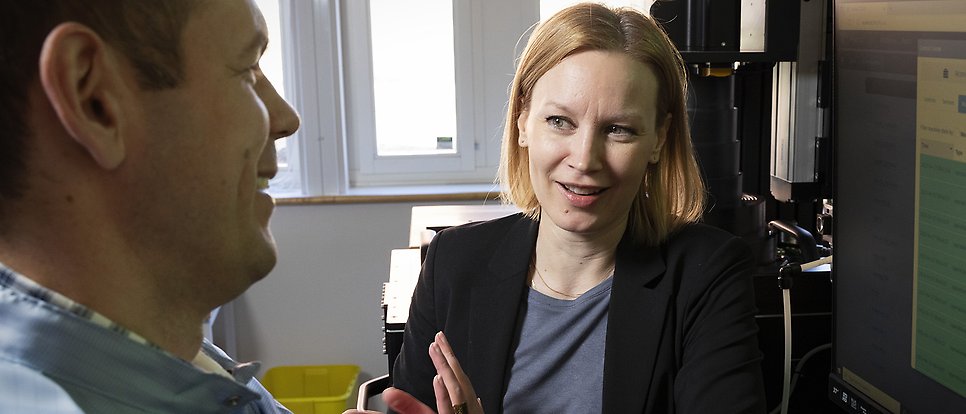Broad collaboration on new technologies for 3D printing

The collaboration within the AM4Life extends across scientific fields. The Director is Professor Cecilia Persson from science and technology. Photo: Mikael Wallerstedt
The AM4Life Competence Centre brings together expertise from technical and medical sciences at Uppsala University, as well as higher education institutions, hospitals and companies. The goal is to develop new 3D-printed biomaterials and components for healthcare, thereby giving patients a better quality of life.
"Involving clinicians from the beginning is of huge importance if you want to do something close to application," explains Cecilia Persson, Professor of Biomaterials and Director of AM4Life.
The Additive Manufacturing for the Life Sciences Competence Centre , AM4Life, is led by Uppsala University and funded by Vinnova. The focus is on research and education in new technologies for 3D-printing objects such as patient-specific implants with complex structures, improving the reproducibility of 3D tumour models, and speeding up the optimisation of medication.
One of the projects within AM4Life involves the development of magnesium-based alloys for implants. As Cecilia Persson explains, the challenge is to get the material to break down at a rate amenable to growing bones.
“We now have a new project underway in which we can combine a material from one of our companies with our printing process, thus enabling us to develop new material microstructures. Another advantage of 3D printing is that we can, for example, design pore sizes and shapes so that they can facilitate bone ingrowth or lead to a particular concentration of ions in a certain location,” says Cecilia Persson.
Broad subject expertise and good testing opportunities
Around thirty doctoral students, nine of whom are directly funded, are involved in the centre. There they conduct research in projects ranging from the development of high-resolution printing methods to new post-processing processes, new materials for implants, and organ models. Uppsala University’s broad subject expertise in 3D printing, combined with the possibility of testing at various facilities run by AM4Life partners, is a winning collaboration model, says Cecilia Persson.
“If you want to do something closely tied to application, it’s really valuable to involve clinicians right from the start. I also think it helps that in these types of collaborative projects, several of us on the management team have our own experience with the commercialisation process through spin-off companies.”
Interdisciplinary collaboration
The competence centre is a good example of the value of collaboration not only between academia and companies, but also between different subject areas within a higher education institution. Professor Johan Kreuger of the Disciplinary Domain of Medicine and Pharmacy is the centre’s Deputy Director.
“Experience with interdisciplinary projects and access to successful basic and applied research are important factors for Uppsala University’s ability to lead such a large constellation with many different partners,” concludes Cecilia Persson.
Anneli Björkman
AM4Life
- Uppsala University’s Additive Manufacturing for the Life Sciences Competence Centre, AM4Life, is funded by Vinnova from 2020 to 2024.
- The centre brings together 26 partners from healthcare, industry, and academia, including Uppsala researchers in the fields of science and technology, as well as medicine and pharmacy.
- In addition to industrial and academic partners, three public organisations are participating, including Uppsala University Hospital and the Swedish Medical Products Agency.
